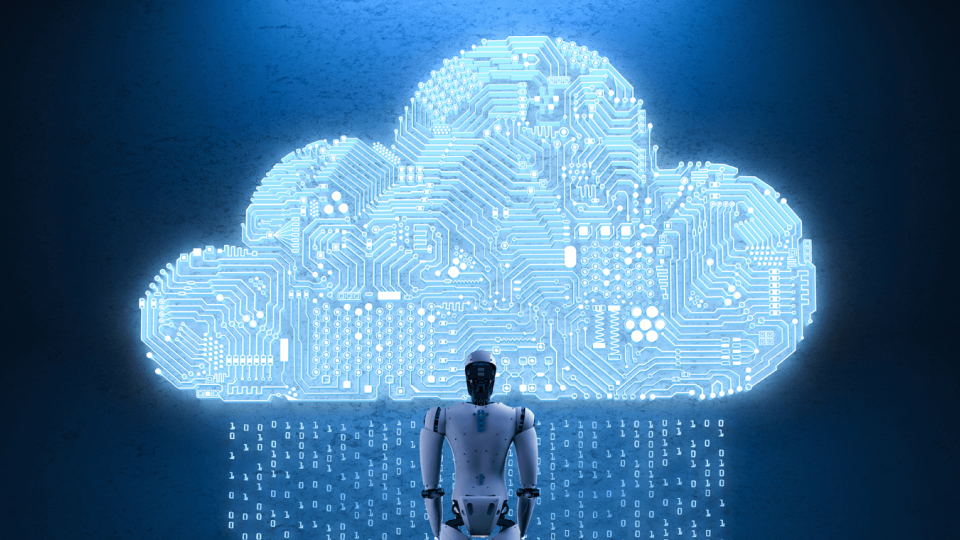Certainly, among the fastest developing areas of technology today are undoubtedly cloud computing and artificial intelligence (AI). The combination of these two fields, commonly abbreviated as "AI," is considered the future of innovation. How this amalgamation will contribute to transforming companies' operations, enhancing efficiency, and gaining a competitive edge is one of the most intriguing questions.
In this article, we will try to explain how the integration of cloud computing and artificial intelligence will shape the future of innovation, supported by statistical data and examples.
What is Cloud Computing and Artificial Intelligence Integration?
We can say that cloud computing and artificial intelligence integration refers to the combined use of various cloud-based resources and artificial intelligence technologies. This integration harnesses the potential of artificial intelligence while leveraging the scalability of cloud computing and ease of access to resources.
Cloud computing refers to the utilization of shared resources accessible over the internet, which can be accessed by accounts as per their requirements. These resources consist of various components such as servers, storage units, network infrastructure, specific applications, and services that can be accessed remotely. The aim of all these is to provide businesses and individuals with the flexibility to utilize resources like secure computational power, storage space, and software services.
Artificial intelligence (AI), also known as yapay zekâ, is a technology that mimics human intelligence, allowing computer applications to learn from experiences through iterative processing and algorithmic training. AI is built upon algorithms and models capable of performing tasks such as learning, analysis, prediction, and decision-making. Artificial intelligence techniques such as machine learning and deep learning are used for big data analysis and solving complex problems.
Integration of cloud computing and artificial intelligence enables AI to operate on cloud computing infrastructure and be used on a larger scale. Cloud computing provides the intense computational power, data storage, and processing capacity needed for AI, while AI, in turn, utilizes cloud computing infrastructure to perform tasks such as data analytics, training and deploying machine learning models seamlessly and efficiently. We can liken this to the transition from manual transmission vehicles, where drivers had to shift gears manually within a certain rev range, to automatic and then fully automatic transmissions. Similarly, explaining how artificial intelligence overcomes mandatory infrastructure constraints and seamlessly transitions to a higher level when necessary isn't entirely unreasonable.

The Importance of Cloud Computing and Artificial Intelligence Integration:
Cloud computing provides a platform that unleashes the power of artificial intelligence. AI algorithms can leverage the big data processing capabilities of cloud-based services and generate faster results. As a result, businesses can benefit from making better decisions, offering personalized experiences, and enhancing operational efficiency.
This integration not only provides businesses with smarter and more efficient solutions but also offers opportunities to accelerate innovation and gain a competitive advantage. When the widespread availability of cloud computing infrastructure combines with the analytical and learning capabilities of artificial intelligence, the emergence of new business models and advanced services becomes inevitable.
Advantages Offered by Cloud Computing and Artificial Intelligence Integration:
Data Processing Speed: Cloud-based services enable artificial intelligence to process large datasets quickly, allowing for faster results. Scalability facilitates the artificial intelligence model to produce faster outcomes.
Data Storage and Access: Cloud computing facilitates the storage and easy access of data that artificial intelligence will use. Large datasets can be stored in the cloud environment and accessed whenever needed.
Cost Efficiency: Cloud-based services reduce hardware and infrastructure costs while enabling the development of artificial intelligence applications more economically.
Areas of Cloud Computing and Artificial Intelligence Integration in Businesses:
Advanced Data Analytics: Cloud computing enables artificial intelligence algorithms to analyze large datasets and derive meaningful insights. For instance, cloud computing can be used to support artificial intelligence in areas such as customer behavior analysis, improving marketing strategies, and risk analysis
Machine Learning and Model Training: Cloud computing provides access to extensive resources for training and retraining artificial intelligence models. Training models on large datasets is crucial for achieving better results.
Internet of Things (IoT) Applications: Cloud computing provides an ideal platform for processing data from IoT devices and analyzing it with artificial intelligence algorithms. Cloud computing and artificial intelligence integration have significant potential in smart homes, the healthcare sector, and industrial automation, among others.
Customer Experience: Artificial intelligence enhances customer experience through cloud-based customer service and personalization applications. Chatbots, recommendation engines, and voice assistants offer customers better interaction.
Operational Efficiency: Artificial intelligence and cloud computing combine automation and forecasting capabilities in operational processes. Businesses achieve better results in areas such as inventory management, demand forecasting, and efficiency analysis.
Healthcare Services: Artificial intelligence algorithms play a significant role in cloud-based healthcare services, including disease diagnosis, medical image analysis, and drug discovery.

Statistical Data Insights:
According to IDC's report, the total value of the cloud computing and artificial intelligence market is expected to exceed $200 billion by 2023.
Gartner predicts that the use of cloud computing for artificial intelligence and machine learning will grow five times faster than data center-based solutions by 2025.
According to a study by Deloitte, the support of cloud computing infrastructure for artificial intelligence initiatives helps companies reduce costs, increase efficiency, and accelerate innovation.
In summary, we can say that cloud computing and artificial intelligence are the technologies of the future. As cloud computing continues to progress towards becoming the predominant computing model in the coming years and artificial intelligence continues to reshape the technology landscape every day, we will witness revolutionary technological advancements brought about by the combination of these two powerful technologies in the future. For System Integration Solutions, Vmind is here for you...
Sources:
IDC, "Worldwide Semiannual Cognitive/Artificial Intelligence Systems Spending Guide".Gartner, "The Future of Cloud AI Services".Deloitte, "AI-as-a-Service: Fueling the Next Wave of Innovation Powered by Cloud and AI"


